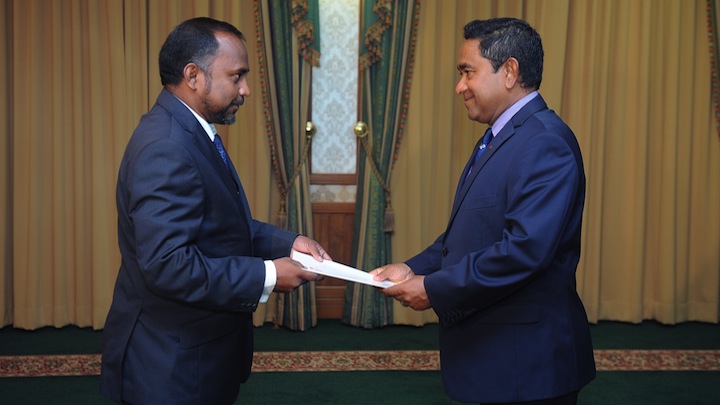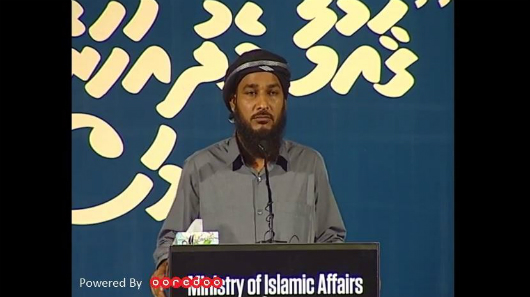The religious conservative Adhaalath Party has decided to field parliamentary candidates in 28 constituencies reserved by the governing coalition for the Jumhooree Party (JP), following a breakdown in talks between the parties.
In a press statement today, Adhaalath accused the JP of offering seats with the intention of “exploiting the trust and support of the public for Adhaalath to win as many seats as possible in the election for the Jumhooree Party.”
“The party does not believe now that [fielding candidates for] the 28 seats the Jumhooree Party will be contesting through the Progressive Coalition falls outside the party’s ethical responsibility,” the statement read.
Adhaalath assured its members that it would compete “to the best of our competence and ability” in constituencies the party believes it could win.
An Adhaalath Party council member told Minivan News last week that the party’s members have expressed interest in contesting for 32 constituencies.
He added that Adhaalath’s candidates may be the most qualified, with almost all having educational qualifications at a postgraduate level.
Coalition agreement
The ruling coalition – made up of the Progressive Party of Maldives (PPM), the JP and the Maldives Development Alliance (MDA), led by resort tycoon Ahmed ‘Sun Travel’ Shiyam – meanwhile reached an agreement last week to allocate parliamentary constituencies among the coalition partners.
Of the 85 electoral constituencies, the PPM will contest 49, the JP will contest 28, and the MDA will contest eight seats.
Following its exclusion from the coalition’s parliamentary election plans, PPM Deputy Leader Abdul Raheem Abdulla told the press that the Adhaalath Party was not “an official partner of the Progressive Coalition.”
“So the parties’ idea is to give them what we can from the seats which have been allocated to us,” Raheem said.
The Adhaalath Party began negotiations with coalition parties last week and requested the JP to assign five constituencies for its candidates.
The talks however ended unsuccessfully after the JP refused to cede the Vaikaradhoo and Makunudhoo constituencies in Haa Dhaalu atoll – two seats the Adhaalath Party believed its candidates had the best chance of winning.
“Instead, the [JP] proposed constituencies where the Adhaalath Party’s support is weakest,” today’s press release stated.
The party noted that it had decided to contest the parliamentary elections with the Progressive Coalition to prevent the opposition Maldivian Democratic Party from securing a parliamentary majority.
The Adhaalath Party was prepared to compromise and accept a few constituencies to campaign jointly with the governing coalition, the statement added.
However, if an understanding could not be reached, the party’s intention was to independently contest as many seats as possible, the party stated.
“Despite not reaching an agreement with the Progressive Party of Maldives in the discussions held on this issue so far, if the [PPM] cedes the few constituencies that we have requested, the Adhaalath Party will not compete in the other constituencies that the [PPM] will be contesting for,” the press release concluded.
No deal
In last year’s presidential election, the Adhaalath Party initially endorsed former President Dr Mohamed Waheed before eventually backing JP candidate Gasim Ibrahim, who finished third in the first round of the contentious polls.
In the second round, the party backed PPM candidate Abdulla Yameen without a formal coalition agreement.
Following the unsuccessful talks last week, JP Leader Gasim Ibrahim told the press that Adhaalath Party President Sheikh Imran Abdulla had refused the JP’s offer of four seats, including three of five constituencies requested by the party.
“[Imran said] ‘no, no, we don’t want those constituencies, we cannot give up certain constituencies.’ So I said thank you very much. What can I do when they did not accept?” Gasim said last Thursday.
The business magnate noted that the JP had “no commitments” to the Adhaalath as the coalition agreement formed ahead of the presidential election no longer existed.
On the same day, Imran tweeted that the party would “not find it easy to make a deal” that did not involve allocating the Makunudhoo, Vaikaradhoo, Komandoo, Inguraidhoo, and Fares-Maathoda constituencies to Adhaalath candidates.
“Adhaalath could only contest the Majlis [election] with the coalition if the coalition concedes areas where Adhaalath has support,” Imran tweeted today.
Meanwhile, Islamic Minister Dr Mohamed Shaheem Ali Saeed, spokesperson of the Adhaalath Party, took to Facebook yesterday to condemn remarks in the media by senior JP members that he contended “undermined Adhaalath Party’s dignity.”
“Adhaalath does not have to ask the JP to contest for the Majlis,” he wrote.
An unnamed senior JP official told newspaper Haveeru on Friday that the Adhaalath Party had forfeited the opportunity to contest the parliamentary election on coalition tickets.
“Despite not having an official agreement with Adhaalath Party, our leader decided to give seats to the party because he loves Adhaalath. But they wanted too many seats,” the senior member was quoted as saying.
Likes (0)Dislikes
(0)Dislikes (0)
(0) 
